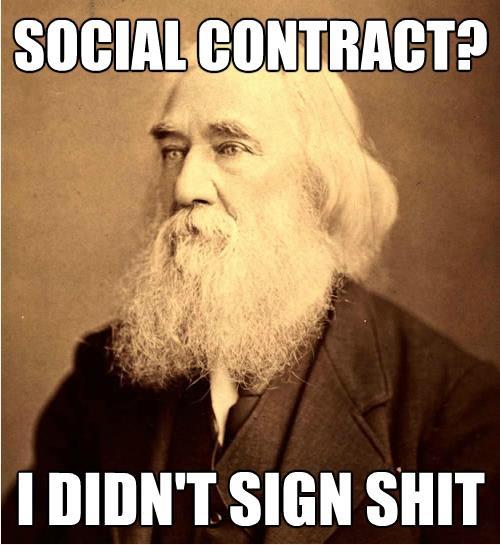
Butler Shaffer wrote an article discussing social contract theory. Needless to say he absolutely nailed it:
Imagine that you have agreed with an auto dealer to purchase the luxurious Belchfire X-1 automobile, for which you agree to pay $45,000, with monthly payments to extend over a period of three years. You sign the sales agreement, and are then told to return the following day to sign the formal contract, which you do. When you arrive two days later to pick up the car, the dealer presents you with the title and keys to a much lesser model, the Klunkermobile J. When you ask the dealer to explain the switch, he points to a provision in the contract that reads: “Dealer shall be entitled to make ‘reasonable’ adjustments it considers to be ‘necessary and proper’ to further the ‘general welfare’ of the parties hereto.” He also tells you that the amount of the payments will remain the same as for the Belchfire X-1; that to provide otherwise would be to impair the obligations of the contract. You strongly object, arguing that the dealer is making a fundamental alteration of the contract. The dealer then informs you that this dispute will be reviewed by a third party – his brother-in-law – who will render a decision in the matter.
Social contract theory is nothing more than a statist’s wet dream. If people buy into it then, suddenly, all of the statist’s actions are morally justified. Even strict constitutionalists will use the social contract argument, claiming that the United States Constitution is a contract between the state and the people and if it is violated then the people have a moral justification to overthrow the state.
Unfortunately for those of us who believe in individual liberty social contract theory has caught on. It’s entirely one-sided though. The state not only gets the privilege of writing the contract but they also get a monopoly on interpreting the contract. You, by merely existing, are said to be a signatory to the contract. When you believe the state has violated a term in the social contract the matter is taken up with a court, which is controlled by the state. No third-party arbitration is allowed, the deck is rigged, or as my friend often says, vilescit origine tali (the dice were loaded from the start).
Even accepting the fantasy of a “social contract” theory of the state creates more fundamental problems. The legitimacy of a contract depends upon the existence of “consideration.” This means that the party seeking enforcement must demonstrate a changing of one’s legal position to their detriment (e.g., giving up something of value, making a binding promise, foregoing a right, etc.) Statists may argue that their system satisfies this requirement – by supposedly agreeing to protect the lives and property of the citizenry, and agreeing to respect those rights of people that are spelled out in the “Bill of Rights.” The problem is that – thanks to the opinions of numerous brothers-in-law who comprise the Supreme Court – the powers given to the state have been given expansive definitions, and the rights protected by the “Bill of Rights” are given an increasingly narrow interpretation.
People often point to the clear language of the Bill or Rights to demonstrate the acts the state isn’t allowed to do. While the language may be clear to you or me, we are not the ones who get the privilege of interpreting it. It has never been about the language, it’s been about the interpretation. I can take the most seemingly straightforward statement and twist it to mean anything I want. As Cardinal Richelieu once said, “If you give me six lines written by the hand of the most honest of men, I will find something in them which will hang him.”
Who in their right mind would sign this social contract? What third-party would agree such a contract was valid? This is the flaw in social contract theory, the contract they allude to isn’t valid under contract law. One of the biggest flaws in the United States Constitution, besides granting the federal government power to tax, is allowing the courts that interpret the Constitution to be controlled by the same state the Constitution is supposedly binding. It is impossible to legally bind somebody if you give them the power to determine what is legal.
When you look at the goal of statists, to have a large gun to wield against those who disagree with them, social contract theory makes nothing but sense. It’s just like something a mafioso would come up with.